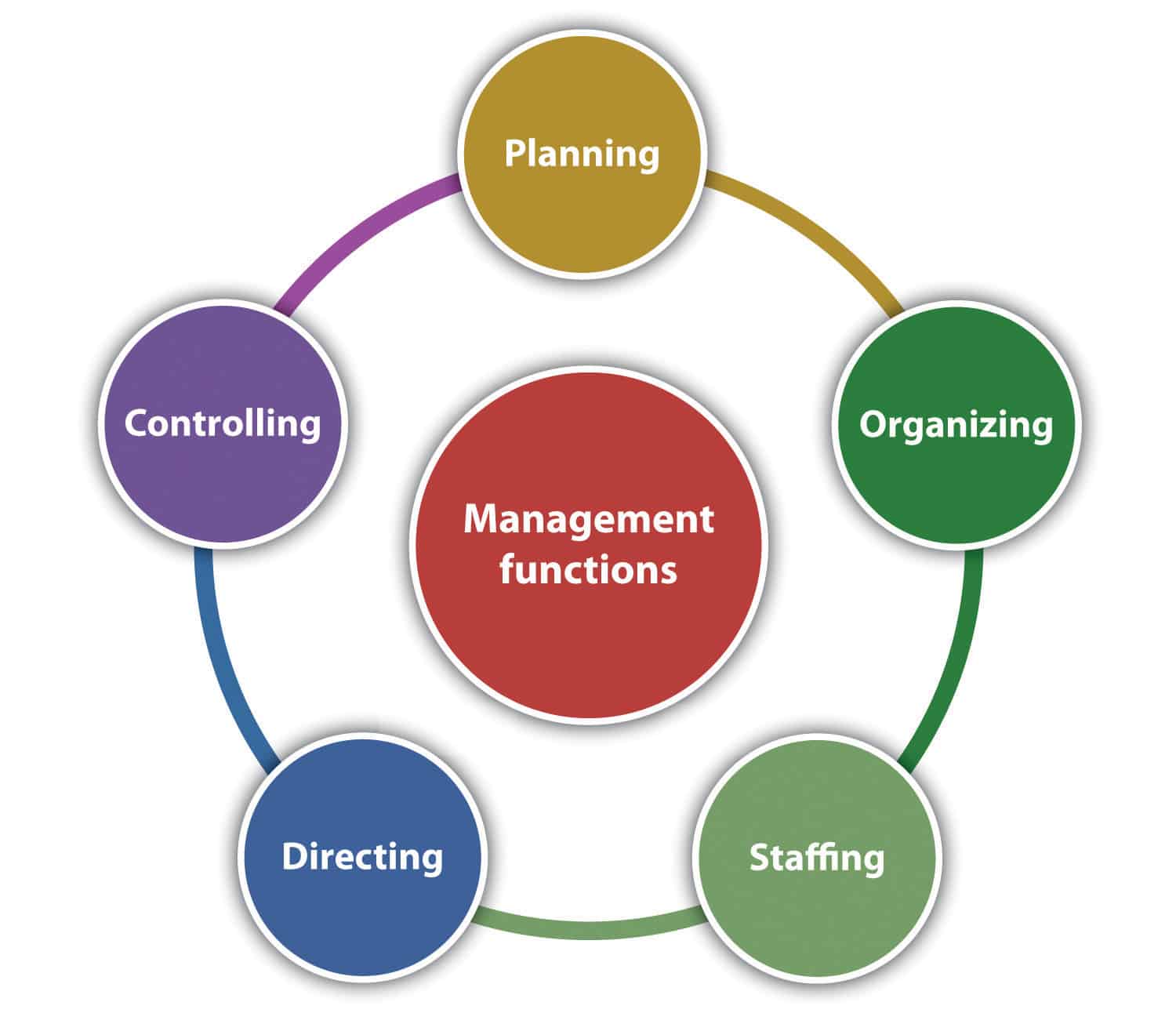What is Management?
Management is essential for an organized life and necessary to run all types of management. Good management is the backbone of successful organizations. Managing life means getting things done to achieve life’s objectives and managing an organization means getting things done with and through other people to achieve its objectives.
Whether management is an art or science, will continue to be a subject of debate. However, most management thinkers agree that some form of formal academic management background helps in managing successfully. Practically, all CEO’s are university graduates. Hence, the reason for including business degree programs in all academic institutions.
Management is a set of principles relating to the functions of planning, organizing, directing and controlling, and the application of these principles in harnessing physical, financial, human, and informational resources efficiently and effectively to achieve organizational goals.
Definition of Management
Many management thinkers have defined management in their own ways. For example, Van Fleet and Peterson define management, ‘as a set of activities directed at the efficient and effective utilization of resources in the pursuit of one or more goals.’
Megginson, Mosley, and Pietri define management as ‘working with human, financial and physical resources to achieve organizational objectives by performing the planning, organizing, leading and controlling functions‘.
Kreitner’s definition of management:
‘Management is a problem-solving process of effectively achieving organizational objectives through the efficient use of scarce resources in a changing environment.’
According to F.W. Taylor, ‘ Management is an art of knowing what to do when to do and see that it is done in the best and cheapest way ‘.
According to Harold Koontz, ‘Management is an art of getting things done through and with the people in formally organized groups. It is an art of creating an environment in which people can perform and individuals and can co-operate towards attainment of group goals.‘
A leader has certain inherent qualities and traits which assist him in playing a directing role and wielding commanding influence which others. Leadership is an integral part of management and plays a vital role in managerial operations, while management is an integral component of technical as well as social processes. The practice of management is as old as human civilization. However, the study of management in a systematic and scientific way as a distinct body of knowledge is only of recent origin.
Management in some form or another is an integral part of living and is essential wherever human efforts are to be undertaken to achieve desired objectives. The basic ingredients of management are always at play, whether we manage our lives or our business.
For example, let us look at the managerial role of a simple housewife and how she uses the managerial ingredients in managing the home. First, she appraises her household and its needs. She forecasts the needs of the household for a period of a week or a month or longer. She takes stock of her resources and any constraints on these resources.
She plans and organizes her resources to obtain the maximum benefits out of these resources. She monitors and controls the household budget and expenses and other activities. In a large household, she divides the work among other members and coordinates their activities. She encourages and motivates them to do their best in completing their activities. She is always in search of improvement, mentions goals, resources, and means to attain these goals. These ingredients, generally, are the basic functions of management.
Management Can Be Defined In Detail In The Following Categories :
- Management as a Process
- Management as an Activity
- Management as a Discipline
- Management as a Group
- Management as a Science
- Management as an Art
- Management as a Profession
The concept of management is as old as the human race itself. The concept of ‘family’ itself required that life be organized and resources of food are apportioned in a manner so as to maximize the utility of such resources. Taking proper steps to safeguard the family from attacks by wild animals, planning on where to go fishing and hunting and whom to go with, organizing these groups into chiefs and hunting and fishing bands where chiefs gave directions, and so on, are all subtle ingredients of management and organization.
A study of various people around the world shows good examples of organizational structures and organizational evolution over the years. A village open market in a tribe and a large department store in a modern city serves the same needs in a similar fashion, which is putting things together that people need.
While the tribal organization was simple in nature, the modern organization is much more sophisticated and complex with many technological innovations. However, the basic form of management and organizational structure seems to have existed since the beginning of organized human activity.
Even the recorded history shows the application of some current management techniques as far back as 5000 BC. when the ancient Sumerians used written records in assisting governmental operations. The Egyptian pyramids, built as early as 3000 BC., required the organized efforts of over 1,00,000 workers. It would be natural to assume that all functions of modern management, namely, planning, organizing, directing, and controlling played a significant role in the construction of these monuments. Similarly, the early civilization of India bears witness to organized living.
Management, as a system, is not only an essential element of an organized society but also an integral part of life when we talk about managing our lives. Managing life is not much different from managing an organization and this ‘art’ of management has been with us from time immemorial. Just as a well-managed life is much better organized, goal-oriented, and successful, ‘good’ management of an organization makes the difference between the success and the failure of the organization.
Perhaps, the importance of management was highlighted by the late President of the United States, John F. Kennedy when he said that, the role of management in our society is critical in human progress. It serves to identify a great need of our time: to improve standards of living for all people through the effective utilization of human and material sources.
Similarly, Peter F. Drucker, a noted management authority has emphasized the importance of management to social living. He proclaimed nearly 25 years ago that, ‘effective management was becoming the main resource of developed nations and that it was the most needed resource for developing nations.’
A manager’s job is highly crucial to the success of any organization. The more complex the organization, the more crucial is to the manager’s role in it. A good manager makes things happen. The importance of management in any organization was emphasized by Professor Leonard R. Sayles in his address to a group of management development specialists, as follows:
‘We must find ways of convincing society as a whole, and those who train managers in particular, that the real leadership problems of our institutions-the getting things done, the implementation, the evolving of a consensus, the making of the right decisions at the right time with the right people is where the action is. Although we as a society haven’t learned to give much credit to managers, I hope we can move toward recognizing that managerial and leadership jobs are among the most critical tasks of our society. As such, they deserve the professional status that we give to more traditional fields of knowledge.’
There Are Basically Five Primary Functions of Management. These Are:
1. Planning
2. Organizing
3. Staffing
4. Directing
5. Controlling
The controlling function comprises coordination, reporting, and budgeting, and hence the controlling function can be broken into these three separate functions. Based upon these seven functions, Luther Gulick coined the word POSDCORB, which generally represents the initials of these seven functions i.e. P stands for Planning, O for Organizing, S for Staffing, D for Directing, Co for Co-ordination, R for reporting & B for Budgeting.
But, Planning, Organizing, Staffing, Directing, and Controlling are widely recognized functions of management.
(1) Planning
Planning is future-oriented and determines an organization’s direction. It is a rational and systematic way of making decisions today that will affect the future of the company. It is a kind of organized foresight as well as corrective hindsight. It involves predicting of the future as well as attempting to control the events. It involves the ability to foresee the effects of current actions in the long run in the future.
Peter Drucker has defined planning as follows:
“Planning is the continuous process of making present entrepreneurial decisions systematically and with best possible knowledge of their futurity, organizing systematically the efforts needed to carry out these decisions and measuring the results of these decisions against the expectations through organized and systematic feedback”.
An effective planning program incorporates the effect of both external as well as internal factors. The external factors are shortages of resources; both capital and material, general economic trend as far as interest rates and inflation are concerned, dynamic technological advancements, increased governmental regulation regarding community interests, unstable international political environments, etc.
The internal factors that affect planning are limited growth opportunities due to saturation requiring diversification, changing patterns of the workforce, more complex organizational structures, decentralization, etc
(2) Organizing
Organizing requires a formal structure of authority and the direction and flow of such authority through which work subdivisions are defined, arranged, and coordinated so that each part
relates to the other part in a united and coherent manner so as to attain the prescribed objectives.
According to Henry Fayol, “To organize a business is to provide it with everything useful or its functioning i.e. raw material, tools, capital and personnel’s”.
Thus the function of organizing involves the determination of activities that need to be done in order to reach the company goals, assigning these activities to the proper personnel, and delegating the necessary authority to carry out these activities in a coordinated and cohesive manner.
It follows, therefore, that the function of organizing is concerned with:
- Identifying the tasks that must be performed and grouping them whenever necessary
- Assigning these tasks to the personnel while defining their authority and responsibility.
- Delegating this authority to these employees
- Establishing a relationship between authority and responsibility
- Coordinating these activities
(3) Staffing
Staffing is the function of hiring and retaining a suitable work-force for the enterprise both at managerial as well as non-managerial levels. It involves the process of recruiting, training, developing, compensating, and evaluating employees and maintaining this workforce with proper incentives and motivations. Since the human element is the most vital factor in the process of management, it is important to recruit the right personnel.
According to Kootz & O’Donnell, “Managerial function of staffing involves manning the organization structure through the proper and effective selection, appraisal & development of personnel to fill the roles designed in the structure”.
This function is even more critically important since people differ in their intelligence, knowledge, skills, experience, physical condition, age, and attitudes, and this complicates the function. Hence, management must understand, in addition to the technical and operational competence, the sociological and psychological structure of the workforce.
(4) Directing
The directing function is concerned with leadership, communication, motivation, and supervision so that the employees perform their activities in the most efficient manner possible, in order to achieve the desired goals.
The leadership element involves issuing instructions and guiding the subordinates about procedures and methods.
The communication must be open both ways so that the information can be passed on to the subordinates and the feedback received from them.
Motivation is very important since highly motivated people show excellent performance with less direction from superiors.
Supervising subordinates would lead to continuous progress reports as well as assure the superiors that the directions are being properly carried out.
(5) Controlling
The function of control consists of those activities that are undertaken to ensure that the events do not deviate from the pre-arranged plans. The activities consist of establishing standards for work performance, measuring performance and comparing it to these set standards, and taking corrective actions as and when needed, to correct any deviations.
According to Koontz & O’Donnell, “Controlling is the measurement & correction of performance activities of subordinates in order to make sure that the enterprise objectives and plans desired to obtain them as being accomplished”.
The controlling function involves:
a. Establishment of standard performance.
b. Measurement of actual performance.
c. Measuring actual performance with the pre-determined standard and finding out the deviations.
d. Taking corrective action.
All these five functions of management are closely interrelated. However, these functions are highly indistinguishable and virtually unrecognizable on the job. It is necessary, though, to put each function separately into focus and deal with it.









